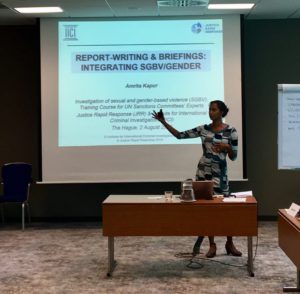 Justice Rapid Response (JRR), in partnership with the Institute for International Criminal Investigations (IICI), held a training course in The Hague, the Netherlands, for experts supporting United Nations Security Council (UNSC) Sanctions Committees, from 29 July to 2 August 2019.
Justice Rapid Response (JRR), in partnership with the Institute for International Criminal Investigations (IICI), held a training course in The Hague, the Netherlands, for experts supporting United Nations Security Council (UNSC) Sanctions Committees, from 29 July to 2 August 2019.
The course was organized in conjunction with the Security Council Affairs Division (SCAD), UN Department of Political and Peacebuilding Affairs, and with the support of the Ministry of Foreign Affairs of the Kingdom of the Netherlands. “The Netherlands is a proud sponsor of this training as it will contribute to better reporting on these horrendous crimes. Improved reporting will enable the Security Council to impose sanctions on the perpetrators and master minds, something we have advocated for continuously during our tenure in the Council last year,” said Marriët Schuurman, Human Rights Ambassador and former Head of the Security Council Task Force at the Ministry of Foreign Affairs of the Kingdom of the Netherlands.
The course brought together 21 currently serving members of Security Council panels and groups of experts, as well as members of SCAD. These expert groups support the work of UN Sanctions Committees through, inter-alia, monitoring and reporting on compliance. Through the primary focus on strengthening the sexual and gender-based violence (SGBV) investigation and reporting skills of the experts, the JRR-IICI course also facilitated greater integration of gender-sensitive considerations into the work of Sanctions Committees’ expert groups. The training course takes place in the wake of Security Council resolution 2467 (2019), which encouraged the inclusion of individuals with dedicated sexual violence and gender expertise in expert groups supporting UN Sanctions Committees. It will allow experts to better consider the gender elements of their work, and cover SGBV violations, where their specific mandates require or allow for the inclusion of SGBV violations.
“This will be an excellent opportunity for the experts to strengthen their knowledge of SGBV investigations at a time when the Council has increased its focus on this topic,” said Kelvin Ong, Chief of SCAD’s Subsidiary Organs Branch. “We’ve seen several instances now where acts involving SGBV have become standalone listing criterion for sanctions regimes, for example, so it’s important for experts to have the capacity to meet these demands.”
“In the past ten years, JRR has played a crucial role in standardizing and strengthening best practices for the investigation of SGBV crimes. This course is a unique opportunity to share some of those practices with the UNSC sanctions committees’ expert groups.” said Nina Suomalainen, Justice Rapid Response Executive Director.
Through a mix of practical exercises and discussions, participants were able to hone a range of relevant skills. Topics covered included: SGBV under international law; the different needs of female and male victims and witnesses in investigations; red flags signifying the potential existence of SGBV; and barriers and stereotypes that may impede SGBV investigations.